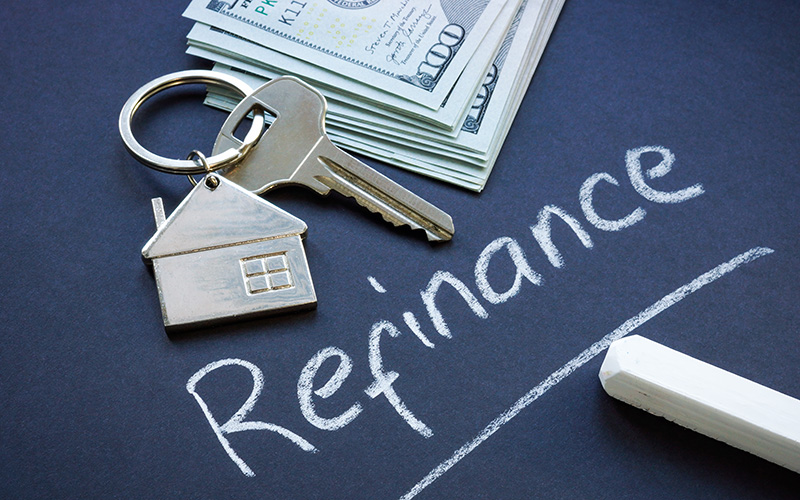If you want to secure a lower interest rate or reduce your loan term, it may be time to refinance your mortgage.

Mortgage rates have been high for some time, which has made refinancing less appealing for many homeowners. However, depending on your situation, refinancing can still be a smart financial decision. While it’s uncertain exactly where mortgage rates will go in 2025, there’s hope they could eventually decline. If you’re looking to refinance your mortgage, staying on top of rate trends is key. When mortgage rates do drop, make sure you’re in a position to take advantage of them.
Here’s what you should know about refinancing and how to get the best rate.
Refinancing 101
Refinancing your mortgage means taking out a new home loan to pay off your current one. It can be a smart move if you are able to secure a lower interest rate, reduce your loan term, or adjust the loan structure to suit your needs. While refinancing can potentially save you a significant amount of money, it’s important to weigh the costs and benefits carefully.
Take this example: a rate reduction of 1% or more could result in a lower monthly payment and significant long-term savings. But refinancing comes with closing costs similar to those you paid when you first bought your home. So before jumping into a refinance, it’s a good idea to crunch the numbers and ensure the savings outweigh the upfront costs.
What’s on tap for 2025?
In 2024, there was an expectation that mortgage rates would begin to decline as inflation eased and the Federal Reserve (Fed) made rate cuts. However, stubborn inflation and resilient labor market data have kept mortgage rates higher for longer than anticipated. As we move into 2025, uncertainty remains about what will happen with rates. Changes from the incoming presidential administration could also influence the economy, adding further unpredictability. And if inflation continues to rise, the Fed may delay further rate cuts, which could keep mortgage rates higher for an extended period.
That said, there’s still a possibility that mortgage rates could decrease in the coming months, potentially reaching 6.5% or lower. With overall housing activity remaining low, 2025 could present a good opportunity to refinance—especially if you’re ready to act when rates drop.
So, does refinancing makes sense for you?
Whether refinancing makes sense for you largely depends on your unique financial situation. While many homeowners refinance to save money, there are other reasons why refinancing might be a good idea. Here are six common reasons people refinance:
- Lower interest rates: If you can secure a rate that’s at least 1% lower than your current mortgage, refinancing can lead to substantial savings on your monthly payments.
- Switch mortgage types: If you have an adjustable-rate mortgage (ARM) and are concerned about future rate hikes, refinancing to a fixed-rate mortgage can give you more stability.
- Eliminate mortgage insurance: If you have an FHA loan with mortgage insurance, refinancing to a conventional loan may allow you to remove the insurance once you have at least 20% equity in your home.
- Adjust loan term: Refinancing to a longer loan term can reduce your monthly payments, while refinancing to a shorter term will allow you to pay off your mortgage faster and save on interest.
- Access home equity: If your home’s value has increased, you may be able to refinance for a larger loan and tap into your home’s equity for cash, which can be used for home improvements, debt consolidation, or other major expenses.
- Divorce or life changes: If your circumstances have changed, such as in the case of a divorce, refinancing can allow you to remove a co-borrower from the loan and keep the home in your name alone.
Set yourself up for refinancing success.
If your credit score isn’t where it needs to be, taking steps to improve it can help you secure a better refinance rate. Here are a few simple ways to boost your credit score before refinancing:
- Pay bills on time: Timely payments are one of the most important factors impacting your credit score.
- Reduce credit card balances: If possible, aim to pay down credit card debt to lower your credit utilization ratio.
- Check your credit report for errors: Even small mistakes on your credit report can hurt your score. Make sure everything is accurate before you apply for refinancing.
If you’re in a good position to refinance when rates fall, you could see significant savings on your mortgage payments.
2025 may very well be an excellent year to refinance your mortgage, especially if rates begin to decrease. While it’s impossible to predict exactly what mortgage rates will do, the general outlook suggests they may go lower over time. By carefully considering your reasons for refinancing, monitoring the market, and improving your credit score, you’ll be well-positioned to make the most of this opportunity when the time comes.
If you’re considering refinancing your mortgage, Certified Title is here to ensure a smooth and seamless process. Reach out today to learn how we can assist you with your refinancing journey. Top of Form
About Certified Title Corporation: Since 1994, attorney-owned Certified Title Corporation has been furnishing residential and commercial real estate stakeholders across the nation with robust title insurance, settlement, and escrow services. Renowned for its industry-leading reliability and exemplary level of service and quality, the Maryland-based company helps clients from all walks of life achieve their asset goals. To learn more, call (888)486-5511 or visit https://www.certifiedtitlecorp.com/.

